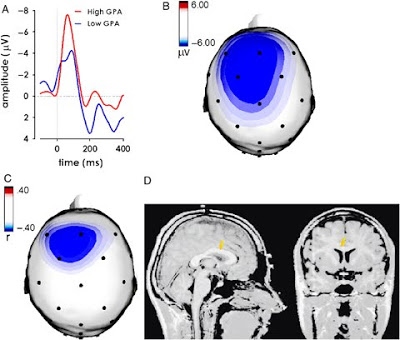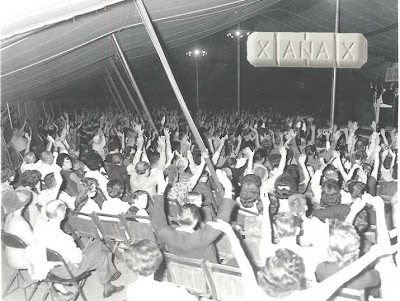Neuroscience

From the authors who brought you "Religion is the Xanax of the people" (aka Neural Markers of Religious Conviction) comes the finding that college students with lower grades are similar to religious zealots on a specific neural response to making an error. Meanwhile, students with high GPAs resemble atheists on the same neural marker. However, the new paper by Hirsh and Inzlicht (2009) did not draw a parallel to their previous study (Inzlicht et al., 2009). In fact, the two findings were interpreted in very different terms. In the new article:
Before going any further, let's look at the experimental design and the neural measures. Both experiments used EEG recordings, specifically event-related potentials. The ERP brain waves reflect electrophysiological activity recorded remotely from the scalp. While it's great for determining the temporal parameters of neural activity, it's not so great at determining where the activity is located in the brain.
The brain wave of interest is the error-related negativity (ERN), recorded at the time that people make mistakes in a task:
The participants were 31 undergraduates who consented to having their transcripts released. Their EEG was measured while they performed the Stroop task, and the ERN was calculated from the response-locked averages on all error trials. The results are illustrated below. Simply put, students with high GPA had a larger ERN response than those with low GPA.

Figure 2 (Hirsh & Inzlicht, 2009). The relation between academic success and the ERN. (A) Event-related potentials at Fz on error trials for individuals with high and low Grade Point Averages, as derived from a tertiary split of the sample. (B) Spatial distribution of the ERN, quantified as the peak minimum voltage deflection occurring between 50 and 150 ms after an error. (C) Headmap of correlations between GPA and ERN magnitude. (D) Source localization indicates an anterior cingulate generator for the ERN.
What might this mean? There is some disagreement about what the ERN wave represents: a direct response to the mismatch between the intended action and the actual one, a more generic response to conflict in general, or an emotional response to f***ing up. The authors opted to impose two different interpretations, so it's not surprising that the ERN can mean different things to different researchers. Or to the same researchers in different contexts. In the present context,

Footnote
1 However, one cannot say for certain that the anterior cingulate is the sole origin of the ERN, because EEG is recorded from the scalp and not inside the brain.
References
Hirsh, J., & Inzlicht, M. (2009). Error-related negativity predicts academic performance Psychophysiology. DOI: 10.1111/j.1469-8986.2009.00877.x
Inzlicht M, McGregor I, Hirsh JB, Nash K (2009). Neural Markers of Religious Conviction. Psychological Science 20:385-92.
- Are Cognitive Factors Related To Criminal Reoffending?
Image from Graphic Sociology Can Brain Activity Predict Criminal Reoffending? The previous post discussed a functional MRI study suggesting that the level of error-related activation in the anterior cingulate cortex (ACC) might have value in predicting...
- Liberals Are Conflicted And Conservatives Are Afraid
This sums up the basic conclusion of a new study on political orientation and brain structure by Ryota Kanai, Tom Feilden, Colin Firth and Geraint Rees in the journal Current Biology. Yes, that Colin Firth... Colin Firth's Speech during the 2011 Academy...
- The Error Of Prognosticating Political View By Brain Wave
Figure 1. Liberals and conservatives in the study of Amodio et al. (2007) voted primarily for Kerry and Bush, respectively, in 2004. Brain wave recordings adapted from Mathalon et al. (2002). You've seen the headlines: Brains of liberals, conservatives...
- The Sad Cingulate Before Cbt
The latest sad cingulate news is an fMRI study that examined the responsiveness of this region (subgenual cingulate cortex, aka Brodmann area 25) to emotional stimuli as a predictor of recovery in depressed patients receiving cognitive behavior therapy...
- Believer Brains Different From Non-believer Brains?
As mentioned in an earlier blog about my research interests, my general (research) focus relates to issues of mental health (schizophrenic symptoms in particular) and I hope to build my career in that area. A side-interest of mine relates to neuropsychological...
Neuroscience
Studious Nerds Are Neurotic and Party Animals Are Antisocial

From the authors who brought you "Religion is the Xanax of the people" (aka Neural Markers of Religious Conviction) comes the finding that college students with lower grades are similar to religious zealots on a specific neural response to making an error. Meanwhile, students with high GPAs resemble atheists on the same neural marker. However, the new paper by Hirsh and Inzlicht (2009) did not draw a parallel to their previous study (Inzlicht et al., 2009). In fact, the two findings were interpreted in very different terms. In the new article:
A greater ability to monitor performance and engage cognitive-control mechanisms when needed thus appears associated with improved real-world performance.Meanwhile, in the prior paper:
...religious conviction is marked by reduced reactivity in the anterior cingulate cortex (ACC), a cortical system that is involved in the experience of anxiety and is important for self-regulation. ... These results suggest that religious conviction provides a framework for understanding and acting within one's environment, thereby acting as a buffer against anxiety and minimizing the experience of error.So the religious people were not utter failures at engaging cognitive control mechanisms, instead they were less anxious. And the smart students were not neurotic, they were better able to monitor their task performance. Hmm.
Before going any further, let's look at the experimental design and the neural measures. Both experiments used EEG recordings, specifically event-related potentials. The ERP brain waves reflect electrophysiological activity recorded remotely from the scalp. While it's great for determining the temporal parameters of neural activity, it's not so great at determining where the activity is located in the brain.
The brain wave of interest is the error-related negativity (ERN), recorded at the time that people make mistakes in a task:
The ERN is evident as a large negative polarity peak in the event-related brain potential waveform that occurs when people make errors in reaction time tasks. It begins at the moment of the error and reaches a maximum about 100 milliseconds later (see Gehring et al., 1993, PDF). It is largest at fronto-central scalp locations and appears to come from an area of the brain called the anterior cingulate cortex...The task used in both studies was the ever-popular Stroop task, in which color words are presented in font colors that either match or conflict with the printed word. Subjects are told to name the color and ignore the word. The Stroop interference effect (slower for BLUE than for RED) arises because reading is a more automatic process than color naming. Thus, subjects are prone to make errors on this task, and that's what the authors were interested in studying.
The participants were 31 undergraduates who consented to having their transcripts released. Their EEG was measured while they performed the Stroop task, and the ERN was calculated from the response-locked averages on all error trials. The results are illustrated below. Simply put, students with high GPA had a larger ERN response than those with low GPA.

Figure 2 (Hirsh & Inzlicht, 2009). The relation between academic success and the ERN. (A) Event-related potentials at Fz on error trials for individuals with high and low Grade Point Averages, as derived from a tertiary split of the sample. (B) Spatial distribution of the ERN, quantified as the peak minimum voltage deflection occurring between 50 and 150 ms after an error. (C) Headmap of correlations between GPA and ERN magnitude. (D) Source localization indicates an anterior cingulate generator for the ERN.
What might this mean? There is some disagreement about what the ERN wave represents: a direct response to the mismatch between the intended action and the actual one, a more generic response to conflict in general, or an emotional response to f***ing up. The authors opted to impose two different interpretations, so it's not surprising that the ERN can mean different things to different researchers. Or to the same researchers in different contexts. In the present context,
As predicted by models of self-regulation and cognitive control, academic performance was correlated with ERN magnitude, with better grades being associated with stronger (more negative) ERN responses, r= -.40."Cognitive control" (a sometimes murky concept) was evaluated by looking at post-error slowing, i.e. how much a person slows down on the trial immediately after making a mistake. If a subject has slowed down a lot, that means he's reined in the overly fast reaction time that led to the error in the first place (by responding more cautiously on the next trial). In the present study, a greater degree of post-error slowing was associated with larger ERN amplitudes and higher grades -- and viewed as an exemplar of greater cognitive control. This was taken to have sweeping implications for the rest of their lives:
Academic performance is a gateway to many important life outcomes, influencing the career options that are available to a student. At the broader societal level, achievement in academic domains plays a vital role in sustaining cultural and scientific innovation. The current study suggests that individuals who are better able to monitor their performance and engage cognitive control mechanisms when needed enjoy greater success in undergraduate programs.How does this relate to smaller ERNs in highly religious persons? Do religious zealots have poor cognitive control? Or does it mean that lower grades are the Xanax of the people (Inzlicht et al., 2009)?
How is it that religion can bring about both peace of mind and zealous conviction? We suggest that religious conviction buffers against anxiety by providing relief from the experience of uncertainty and error, and in so doing, strengthening convictions and narrowing attention away from inconsistencies. We hypothesize that this muted response to uncertainty and error is evident neurophysiologically such that religious conviction is associated with reduced activity in the anterior cingulate cortex,1 a cortical system involved in a form of attention that serves to regulate both cognitive and emotional processing.Read more in Atheists Are Neurotic and Religious Zealots Are Antisocial.

Footnote
1 However, one cannot say for certain that the anterior cingulate is the sole origin of the ERN, because EEG is recorded from the scalp and not inside the brain.
References

Hirsh, J., & Inzlicht, M. (2009). Error-related negativity predicts academic performance Psychophysiology. DOI: 10.1111/j.1469-8986.2009.00877.x
Inzlicht M, McGregor I, Hirsh JB, Nash K (2009). Neural Markers of Religious Conviction. Psychological Science 20:385-92.
- Are Cognitive Factors Related To Criminal Reoffending?
Image from Graphic Sociology Can Brain Activity Predict Criminal Reoffending? The previous post discussed a functional MRI study suggesting that the level of error-related activation in the anterior cingulate cortex (ACC) might have value in predicting...
- Liberals Are Conflicted And Conservatives Are Afraid
This sums up the basic conclusion of a new study on political orientation and brain structure by Ryota Kanai, Tom Feilden, Colin Firth and Geraint Rees in the journal Current Biology. Yes, that Colin Firth... Colin Firth's Speech during the 2011 Academy...
- The Error Of Prognosticating Political View By Brain Wave
Figure 1. Liberals and conservatives in the study of Amodio et al. (2007) voted primarily for Kerry and Bush, respectively, in 2004. Brain wave recordings adapted from Mathalon et al. (2002). You've seen the headlines: Brains of liberals, conservatives...
- The Sad Cingulate Before Cbt
The latest sad cingulate news is an fMRI study that examined the responsiveness of this region (subgenual cingulate cortex, aka Brodmann area 25) to emotional stimuli as a predictor of recovery in depressed patients receiving cognitive behavior therapy...
- Believer Brains Different From Non-believer Brains?
As mentioned in an earlier blog about my research interests, my general (research) focus relates to issues of mental health (schizophrenic symptoms in particular) and I hope to build my career in that area. A side-interest of mine relates to neuropsychological...
